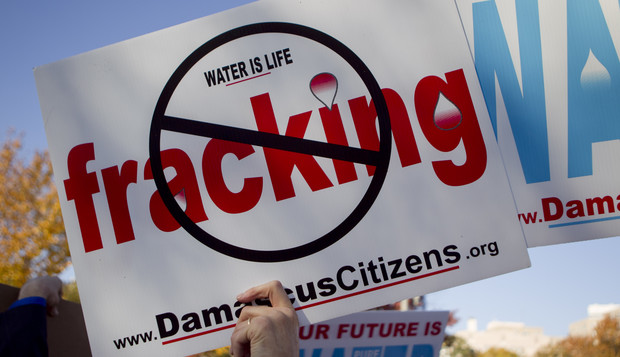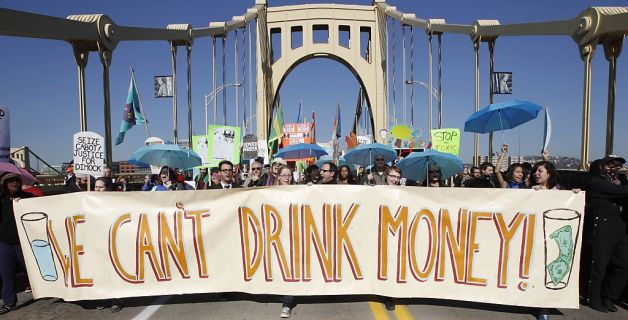California’s fracking hearings continue this week after yesterday’s Sacramento hearing overflowed it’s hearing room and had to be relocated to larger chambers….BAKERSFIELD — January 8, Kern County Administrative Center, first floor board chambers, 1115 Truxtun Avenue, 3-7 p.m.; SALINAS — January 8, National Steinbeck Center, One Main Street, 3-7 p.m.; SANTA MARIA — January 13, Santa Barbara County supervisors hearing room, 511 East Lakeside Parkway, 3-7 p.m.; for more information, see: http://www.conservation.ca.gov/dog/Pages/WellStimulation.aspx#Item2
_________________
http://www.ocregister.com/articles/fracking-596220-oil-water.html
Orange County Register
NEWS
Fracking foes sound off at hearing
A man holds a sign to protest against hydraulic fracturing, also known as fracking, outside the California State University, Long Beach Auditorium where a public hearing to receive comment was scheduled by the Department of Conservation, Division of Oil, Gas, and Geothermal Resources at California State University, Long Beach on Monday.
ANIBAL ORTIZ, LONG BEACH REGISTER
By AARON ORLOWSKI / ORANGE COUNTY REGISTER
Published: Jan. 6, 2014 Updated: 8:35 p.m.
Environmentalists and activists pleaded Monday for state officials to protect California’s air, land and water from the fires of fracking at a public hearing to take comments about proposed statewide rules governing the controversial drilling method.
About 30 activists rallied before Monday’s hearing, denouncing the oil and gas industry, criticizing state officials and agencies and repeating one message: ban fracking. Now.
“We’re the majority. We want fracking banned and 2014 is going to be our year,” said Alex Nagy, a Southern California organizer for Food & Water Watch, an environmental group that organized the pre-meeting rally.
Fracking, or hydraulic fracturing, is a drilling process where a cocktail of water, sand and chemicals is injected into the rock deep beneath the earth’s crust to open wide fissures that allow for the extraction of oil and natural gas.
In September, Gov. Jerry Brown signed into law Senate Bill 4, which tasked the Department of Conservation, and more specifically the Division of Oil, Gas and Geothermal Resources, with crafting rules regulating fracking in California. Those interim rules took effect Jan. 1. Permanent rules – ones the Division of Oil, Gas and Geothermal Resources is taking comment on now – will take effect in 2015.
Though more than 100 people showed up Monday, there was scant support for fracking, or the proposed regulations. Activists from environmental organizations laid out a litany of specific changes they wanted for the rules, while residents from Los Angeles, Orange and San Diego counties, and the Inland Empire, decried the drilling technique.
A representative for Hispanics in Energy, a group advocating Hispanic inclusion in the energy industry, was laughed at while making a statement while a representative from Valley Industry & Commerce Association received minimal applause.
Both argued fracking in California could bring reliable jobs to the region, while aiding energy independence.
“It could reduce our dependence on foreign oil,” said Adriana Fernandez, the legislative affairs manager at VICA, a business advocacy group for the San Fernando Valley.
That’s not so, said Brenna Norton, a Southern California organizer for Food & Water Watch.
“We get our oil on a global market,” Norton said. “We frack here for oil, it doesn’t affect the price at the pump at all. The only way to ensure energy independence is to get off fossil fuels.”
But the main concerns, repeated by almost every anti-fracking speaker, centered around air, land and water. And climate change.
The air could be polluted with more oil development, compounding air quality that is already among the poorest in the country. The land, under strain from the violent blasting under its surface, could tremble with earthquakes in an already earthquake-prone region.
The ground water could be contaminated if fracking fluids leak into it from spills or faulty oil well casings, they said. And questions still remain about whether there’s enough water in this drought-afflicted region to supply the millions of gallons of water needed for the fracking process.
Fracking foes also raised the specter of climate change, saying California regulators should not allow a process that could potentially unleash 15 million barrels of Monterey Shale oil – oil that would add to carbon emissions and climate change.
Others took a more existential approach. Dave This, a Brea resident and member of the Brea Congregational United Church of Christ, said humanity is called to preserve a planet gifted to them by the Creator.
“Regardless of the faith, regardless of whether you’re Christian, Muslim or Buddhist, there’s that thread of taking care of the planet and handing it off in better condition than you received it,” he said.
The Division of Oil, Gas and Geothermal Resources is holding several more public hearings across the state. Norton, of the Food & Water Watch, vowed to continue the fight and drive home the message to Gov. Brown that they want fracking banned.
“We’re already dogging him all across the state,” Norton said. “He can’t go to any public hearing, he can’t go to a birthday party, without us being there. If he doesn’t like it now, he’s not going to like it next year.”
Contact the writer: aorlowski@lbregister.com or 562-310-7684
WHAT’S NEXT
Interim rules permitting but regulating fracking took effect Jan. 1. The Department of Conservation is currently taking public comment on the permanent rules, which will be implemented in 2015.
The Department held public comment meetings in Sacramento and Long Beach Monday. It will host meetings in Bakersfield and Salinas Wednesday and in Santa Maria Monday, Jan. 13.
The Department’s Division of Oil, Gas and Geothermal Resources must also certify an environmental analysis of the rules by July 1, 2015.
The Division is also taking public comments about the environmental analysis, both in writing and at public meetings. The last two of five meetings are being held Wednesday, Jan. 8, in Long Beach and Thursday, Jan. 9, in Ventura. The Long Beach meeting will be at the Long Beach Convention Center from 4 to 8 p.m.
WHAT IS BEING DEBATED?
Senate Bill 4, signed into law in September 2013, required the California Department of Conservation to draft rules regulating “well stimulation,” which includes the controversial oil drilling technique hydraulic fracturing, also called fracking.
A few key points:
Evaluation: The well operator must test the cement of the well casing to make sure it is strong enough and must determine fluids cannot leak away because of well stimulation.
Permit: The permit application must detail where and when a well will be stimulated, what chemicals will be used and their concentration, and include a groundwater monitoring plan and an estimation of waste material, among other things.
Notification: Neighbors must be notified 30 days before a well is stimulated.
Testing: The well must be tested at a pressure 25 percent higher than the expected pressure during stimulation.
Monitoring: The well operator must track a host of factors during and after well stimulation, and notify authorities if certain breaches occur.
Disclosure: The well operator must post information about the composition of the stimulation fluids on a government website within 60 days of ending well stimulation.
Trade secrets: Well operators must disclose the composition of the stimulation fluids to the state, which will decide if it is a trade secret.
The Department of Conservation will hold a series of meetings to solicit public comment. The current rules are temporary and the final version of the rules will be implemented in January 2015.
______________
http://www.bellinghamherald.com/2014/01/06/3407291/fracking-moratorium-urged-by-california.html
Bellingham Herald
Bellingham, Washington
Fracking moratorium urged by California lawmakers
BY JEREMY B. WHITE
The Sacramento Bee January 6, 2014
SACRAMENTO, CALIF. – Reviving an issue that dominated the environmental agenda in 2013, California lawmakers are calling on Gov. Jerry Brown to impose a moratorium on the controversial drilling process known as hydraulic fracturing.
California is at work crafting regulations to govern hydraulic fracturing, or fracking, in which well operators blast a potent mix of chemicals and water underground to shatter energy-trapping rock formations. The new guidelines will set up a permitting system, require more groundwater testing and force companies to disclose information about where they plan to frack and what chemicals they will use.
Those forthcoming regulations are the product of a new law passed last year. Senate Bill 4, by state Sen. Fran Pavley, D-Agoura Hills, was less stringent than other proposed fracking measures that would have halted the practice outright.
In the end, legislators sent Pavley’s bill to Brown even as environmentalist groups forsook the legislation, saying it had been diluted to the point of ineffectiveness.
“I think almost everyone walked out of session feeling unsatisfied, so we want to make sure there is accountability on this industry,” said Assemblyman Marc Levine, D-San Rafael, who last year carried an unsuccessful fracking bill.
Given concerns about the impacts of fracking on groundwater and public health, Levine said, he and three other Assembly members have sent Brown a letter asking for a statewide ban on fracking “until health and environmental concerns are addressed.”
“Current studies show fracking threatens California’s precious water supply, further disrupts our approach to mitigate the dangerous impacts of climate change, exacerbates our pollution problems, and the disposal of wastewater associated with fracking may increase seismic activity,” the letter said.
In an interview with The Sacramento Bee, Levine said he hoped the governor would defer continued fracking operations until regulators have finished the year-long process of laying down new fracking rules.
“I don’t believe we have as much information as we need to continue allowing the oil industry to work unfettered before those regulations are in place,” Levine said.
The fracking issue has increasingly become the lens through which disenchanted environmentalists view Brown. Protesting activists have dogged the governor at events throughout California since he signed Pavley’s bill.
Lawmakers approved Senate Bill 4 last year under the governor’s auspices. Brown interceded as legislators were debating the bill, urging them to pass the measure and promising his signature.
Special thanks to Richard Charter


